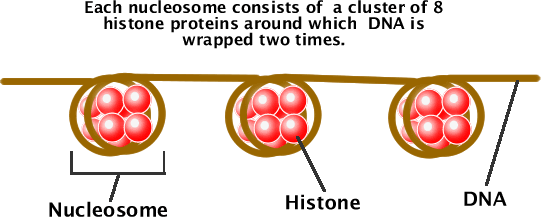

Eukaryotic chromosomes consist of DNA with associated proteins which help wrap the DNA into a tight space. Remember that prokaryotic DNA lacks these proteins, and thus is considered to be "naked".
The proteins that are associated with the DNA of eukaryotic chromosomes are arranged into units known as nucleosomes. Each nucleosome consists of a cluster of 8 histone proteins with the DNA then wrapped twice around each nucleosome (See diagram.). Because there are so many nucleosomes in the eukaryotic chromosome, the DNA can effectively be greatly shortened. In addition, the DNA is folded into tight loops. Because of the loops and nucleosomes, the long DNA molecule which makes up each chromosome can fit into the tiny space of the nucleus.
Other differences between eukaryotic and prokaryotic chromosomes include:
a) eukaryotic chromosomes contain introns (sections of DNA not needed to produce proteins) while prokaryotic chromosomes generally lack these introns.
b) Eukaryotic chromsosomes have sequences of nucleotides that are repetitive and not considered genes. Prokaryotic chromosomes generally lack these repetitive sequences of nucleotides.
c) Within eukaryotic chromosomes, each separate gene is regulated independently. In prokaryotic chromosomes, several genes are arranged in groups and regulated together. Such groups of regulated genes are called operons.